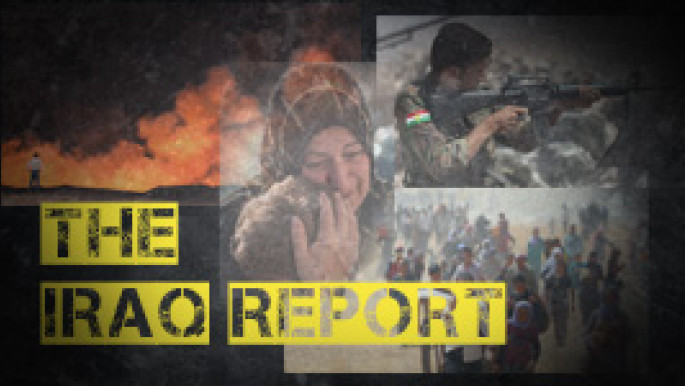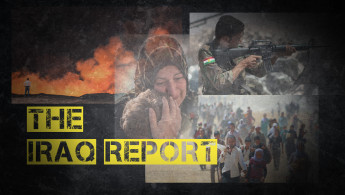The Iraq Report: Elections without participation is no democracy
Click here to receive The Iraq Report each week in your inbox
Iraqis will be heading to polling stations this Saturday in the first election since the Islamic State group blitzed through a third of Iraq in 2014 and incumbent Prime Minister Haider al-Abadi came to power after his predecessor Nouri al-Maliki was forced out. It will also be a landmark moment for Abadi, who declared IS defeated last December and promised both local and national elections that would, according to him, put Iraq back on course to stability, security and prosperity.
However, there are already a number of concerns being raised about the elections, not least of which is the level of participation, and the large number of candidates running for office who have been accused of corruption. Further, the powerful Shia militant coalition, the Popular Mobilisation Forces (PMF), are showing signs of their original rivalry and divisions now that IS has been declared defeated. This could lead to further political violence, as rival political groups try to muscle in on spheres of influence and political positions that have historically turned a profit for those dominating them.
Millions of displaced Iraqis unable to vote
 |
|
| Read more from our archive of special coverage on Iraq |
During the last elections in 2014, the vast majority of Iraq’s largest governorate of Anbar could not vote. The Sunni Arab-dominated territory was of course the site of some of the hardest fighting against IS militants, and then-Prime Minister Nouri al-Maliki decided to declare it a security zone, with active military operations against IS precluding any democratic activities in the governorate. This meant hundreds of thousands of Iraqis were denied their right to vote.
Now that IS has been declared defeated, it seems that the problem of voter disenfranchisement that began in 2014 has actually been exacerbated rather than alleviated, with millions set to be excluded from exercising their democratic rights.
According to the United Nations, more than three million Iraqis are internally displaced in refugee camps, of which only 285,000 are registered to vote, according to the Iraqi electoral commission. UN figures show a further 8.7 million people are in need of humanitarian assistance. With almost 12 million people either displaced or in urgent need in a country of 37 million, it is feared that the election results will not be representative of the Iraqi people, many of whom are too busy trying to eke out an existence rather than spend time scrutinising campaign promises.
Making matters worse is how political allies of Prime Minister Haider al-Abadi have branded millions of their fellow countrymen in the refugee camps as Islamic State group members.
"We have not put up any posters and did not move [to campaign in the camps] because most families are Daesh,” Jassem al-Jubouri, running as part of Abadi’s Victory Alliance, said of the camp inhabitants.
With such inflammatory rhetoric used against Iraqis who were forced to flee their homes because of IS violence and the actions of government forces and allied Shia Islamist militants in fighting them, it is unsurprising that many Iraqis still feel that the system is rigged against them and does not represent their views. These sentiments echo the circumstances that led to the rise of IS in the first place, with the Maliki administration blamed for disenfranchising and marginalising millions of Sunni Arabs by using sectarian policies specifically targeting their community.
 |
|
| In pictures: Election campaigns in Iraq |
Without buy-in from millions of Iraqis who want to feel their voice is represented and impacts their country’s destiny, the elections face a real risk of being hijacked by politicians beholden to outside influences and powerful armed groups.
Shia militants turn against each other as poll nears
Among these politicians are a newly emboldened and elevated political class that has emerged from the Baghdad-backed but Tehran-sponsored Popular Mobilisation Forces, a paramilitary organisation dominated by Shia Islamist militias.
Prime Minister Abadi promised last year that armed groups would not be allowed to run in the elections, but he quickly abandoned that idea when he cut a deal with the PMF and incorporated its commanders into his Victory Alliance electoral list. However, the love affair was short-lived as – after Abadi had legitimised them – they swiftly split off and formed their own Conquest List, directly placing themselves against Abadi.
The PMF has positioned itself as the force that brought IS to its knees, and eventually rolled the militant group back and defeated it. However, its narrative has been challenged repeatedly, particularly as the pro-Iran paramilitary group has itself been accused of perpetrating crimes against humanity and sectarian war crimes against Sunni Arab civilians by Amnesty International, Human Rights Watch and the United Nations.
Further, and since the defeat of IS, fissures have begun to surface between rival factions within the PMF, particularly as two blocs within the organisation are running rival lists.
Hardline Shia clerics such as Qais al-Khazali, the leader of the Asaib Ahl ul-Haq militia, Akram al-Kaabi of the Iraqi Hizballah, and Badr Organisation chief and former cabinet minister Hadi al-Ameri are running an electoral campaign against fellow militant leader Muqtada al-Sadr and his alliance with the Iraqi Communist Party.
 |
| A May Day rally in Baghdad [Getty] |
Sadr – who is notorious for his leadership of a variety of death squads during the US occupation of Iraq – had forged close ties with the communists, reviving an old tradition stretching back decades that saw Shia Islamists finding common ground with far-left Iraqi groups, many of whom recruited from the Shia Arab demographic. Sadr hopes to boost his once-dominant parliamentary control by reaching out to the communists, while undercutting the efforts of his fellow militant leaders who lean closer to Iran.
Read more: More divided than ever, Iraq's Kurds risk shooting themselves in the foot
Iran, in the meantime, has been continuing its strategy of having a finger in every pie, supporting the PMF’s Conquest List while simultaneously allowing for the campaign posters of Abadi’s Victory Alliance to be prominently displayed in major Iranian cities, including one of the major seats of Shia theological learning, Qom.
Twitter Post
|
By pushing support to each of the rival groups, Tehran ensures that no one of its proteges can gain a dominant position in parliament, which will force these factions to continue returning to Iran to curry favour with the regime there. Iran thus ensures that it continues to play the role of kingmaker, while in reality holding most of the cards at the table and influencing Iraq’s future no matter who runs for elections.
IS still at large, targeting candidates
Against the backdrop of the elections and triumphalist rhetoric that seeks to project the sentiment that Iraq is finally on the mend and will soon be back on track, the forces of the Islamic State group have continued their campaign of violence across the country.
At the start of the month, IS gunmen managed to breach security in Tarmiyah, just north of the Iraqi capital of Baghdad, firing indiscriminately into a civilian crowd. Seven people were killed, with a further 14 injured, and civilians had to reportedly resort to their own personal weapons to fend off the attackers as the Iraqi security forces were criticised for this deadly lapse in security. A large force of federal police officers and military personnel were dispatched to Tarmiyah, but only after the attack had already ended.
Tribal leaders in Anbar governorate last week raised the alarm that IS militants were still very active in the area, and had been known to disguise themselves as police officers or even inconspicuous shepherds to evade detection. Many tribal leaders are expecting an escalation of IS attacks targeting polling stations during this weekend’s vote, and fear that the authorities have not done enough to keep people safe. Last month, IS militants launched a suicide attack on a political party’s Anbar headquarters, killing four people and wounding a parliamentary candidate.
Another parliamentary candidate was murdered in his home on Sunday night in the former IS bastion of Mosul. Farouq Mohammed Zarzour was stabbed to death after men forced their way into his house. IS claimed responsibility for the murder, accusing Zarzour of being “an atheist”. The knifemen came to Zarzour’s home pretending to be supporters of his campaign, before surprising the candidate, forcing their way inside, and stabbing him to death.
With such brazen attacks against parliamentary candidates becoming a more regular feature of IS’ activities in Iraq, the militants are making it clear they are far from defeated and can still inflict severe damage. Iraqis may soon be looking to Prime Minister Abadi to answer questions on how he considers IS to have been vanquished while the extremists are busy assassinating politicians.
Click here to receive The Iraq Report each week in your inbox



